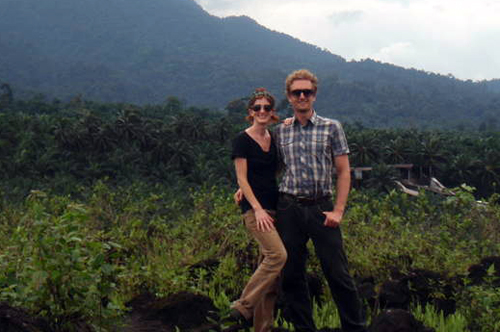
If cooked spinach or kale are among your favourite foods, Cameroon might be your preferred African country to visit, says political science professor Adam Sneyd. “There is an incredibly diverse variety of wild and domesticated greens used in the stews that are commonly eaten in Cameroon.”
And you might want to invite Sneyd’s wife, Lauren Scannell, a PhD student in geography and international development, to give you some tips on cooking all that kale and more exotic greens. She recalls that on her first trip to Cameroon in 2010, she visited the market in the capital city of Yaounde to buy food.
“Most of the foods I saw were initially unfamiliar to me,” she says. “So I started cooking lessons and learned how to prepare foods that are native to the Congo Basin. These foods are only found in this region and they are delicious!”
Sneyd and Scannell are enjoying those tasty local greens this summer while working in Cameroon where they are conducting research on food-related topics. Sneyd has a grant from the Africa Initiative, a collaborative project of the Centre for International Governance Innovation, Makerere University in Uganda and the South African Institute for International Affairs (see www.africaportal.org for more information).
“Cameroon is an African country where food is available to most people, most of the time,” says Sneyd. However, social and economic access to food has been a consistent problem. In 2008, riots linked to the rising costs of food and fuel broke out across the country.” That underscored the need for research into food security and policy reforms.
Sneyd had spent two months in Cameroon in 2010, studying corporate social responsibility in the forest sector, and is now seeking to understand the ways that Cameroon’s new investors and trading partners might be contributing to or detracting from food security.
He explains that over the past five years, investors from China, Malaysia, Singapore and South Korea have all expressed interest in establishing large-scale agricultural operations in Cameroon. India and Brazil have also scaled up their trade connections with the country. Sneyd’s work is investigating the perspectives on food security of these new investors and trading partners, and how they might be similar to or different from the perspectives of groups such as local and national governments, or United Nations agencies such as the Food and Agriculture Organization.
“There’s a great deal of local interest in my research,” Sneyd adds. “The topic is very politically sensitive as large-scale agricultural investment has the potential to generate significant tax revenues and foreign exchange earnings. I hope to uncover the ways that people are currently talking with each other – or talking past each other – when it comes to the policies needed to ensure food security.”
He has written an article about these issues for the Africa Initiative website.
Scannell is studying the marketing and consumption of wild foods in cities in Cameroon, interviewing both the people who gather the foods and sell them in the city markets (called “buyam-sellams” in the pidgin language), and those who buy the foods and prepare them for their families. Her research is funded by a SSHRC doctoral fellowship.
The wild foods sold range from spices (njansan and rondelle) to fruits (bush mangoes and bush cherries), vegetables (eru), medicinal plants, mushrooms and animals (cane rats and duikers), says Scannell. “The wild foods provide dietary diversity and contribute to health because they are high in vitamins and minerals. Most are sold by women.”
The importance of her work was recently underscored when a riot broke out earlier this summer in one of the largest markets in Yaounde. “It was not related to food prices, but rather to access to space to sell their goods,” explains Scannell. There were more sellers than space in the market area, so people were setting up stalls outside, blocking traffic and sidewalks. A committee called the Fight Against Urban Disorder sanctioned a week-long effort to remove these unofficial traders using bulldozers and water cannons, and confiscating the goods being sold. This resulted in a riot where police used teargas and batons and at least one person was killed. The entire market was then shut down for a week.
“This has not been easy on the traders, and many moved to other markets to sell their goods,” adds Scannell. “This put pressure on the space limitations of the other markets.” The situation demonstrates that price and food availability are not the only factors in urban food security: issues of space and access to markets matter too.
As they interview people about these issues, Sneyd and Scannell have also had the opportunity to travel to different parts of Cameroon. Despite the obvious differences, Sneyd says Canadians might be surprised by how many similarities there are between Canada and Cameroon.
“Both have a strong history of agricultural production and internal trade, massive tracts of forest, a lot of water and hydroelectric power projects, and significant oil industries. Both countries are officially bilingual in French and English. Both have a huge diversity of landscapes – the cliché is that Cameroon is ‘Africa in miniature.’”